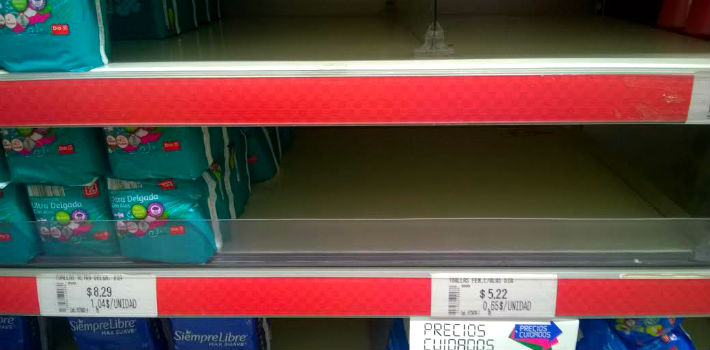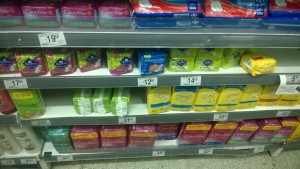
Just one day into summer in Argentina, and tampons have been disappearing. With the peso exchange rate fixed to the US dollar — artificially high — few currency reserves are available for imports. In other words, this essential product was nowhere to be found in eight out of the 10 pharmacies and supermarkets in Buenos Aires visited by the PanAm Post.
In the majority of stores, the most popular brands of the sanitary product are simply missing. The Día supermarket and the Farmacity chain, did have tampons in stock, but only a limited range aside from their own house brands.

One woman in a city center pharmacy said that she bought boxes whenever she came across them, “because you don’t know when you’ll have the chance again.” She reported that, as of a few weeks ago, single tampons had disappeared from shelves, with only boxes of 20 available.
One pharmacy in the Colegiales neighborhood confirmed that they haven’t been resupplied in at least three weeks. “I’ve sold what I had in stock,” said the manager. “Now I’ve nothing left.”
Disgruntled consumers have voiced their complaints on social media. Some quip that Argentineans are now boosting the value of their life savings by exchanging them for tampons, while others are comparing the situation with the scarcity of basic products in Venezuela.
@silvinamarq No dejan importar tampones. Tam po nes… Cada vez más parecidos a Venezuela.
— ??? (@PiaAsao) December 17, 2014
Por el tema de importaciones están escaseando los tampones. MADRE MÍA. Somos ÁFRICA.
— • ᴀʟᴇᴊᴀɴᴅʀᴀ • ???? (@aleambrosino) December 18, 2014
Shortages throughout 2014
The Buenos Aires College of Pharmacists told the PanAm Post that while tampons and sunscreen have been scarce throughout all of 2014, shortages have now become more visible with the onset of summer.

“The reality is that the scarcity has become more pronounced since October and November. Furthermore, we’re also lacking the raw imported materials needed to manufacture tampons in the country,” said a spokesperson, who preferred to remain anonymous. The individual further indicated that shortages had been confirmed by laboratories and pharmacies throughout the country.
In November, Georgina Giraldi, vice-president of Cordoba’s College of Pharmacists, sounded the alarm over shortfalls in certain products, including adult diapers, sanitary towels, and tampons.
The Buenos Aires spokesperson suggested that shortages could ease up in January, with a new shipment currently waiting to be cleared by customs officials.
A Structural Problem
For Aldo Abram, a professor at the ESEADE University Institute, and executive director of the Foundation for Liberty and Progress, the problem will only worsen unless the government loosens its hold on the dollar and frees up greater reserves of foreign currency to pay for imports.
“Importers are urgently calling for dollars; they’re being restricted by these government policies,” he told the PanAm Post. “The lower the exchange rate is compared to what it should be, the fewer people want to exchange dollars. The Central Bank, therefore, has to increasingly restrict imports to keep the exchange rate artificially low.”
Abram further argues that government policies were serving to disincentivize supply: “The mistake that several companies made was trusting in the authorities,” in relation to previous government promises that businesses would receive enough dollars to import goods.
He warns that the difficulty of accessing foreign currency will only increase if the fixed exchange rate continues. This will in turn restrict imports, as the government seeks to retain sufficient dollars to back the fictitious price.
Translated by Laurie Blair. Edited by Fergus Hodgson.
 Versión Español
Versión Español












